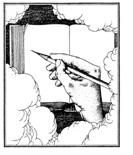
Find Your Career in the Church — The Scientific Way
GUEST COLUMN
The Minnesota Multiphasic Personality Inventory (MMPI) is a long-standing psychological instrument used to identify personality types. It is often administered to prospective employees by business, government — and the Church — as a screening device. The MMPI lists a series of statements, and the applicant must indicate whether the statements apply to him or not. Many adult professionals may be familiar with the test.
Have you ever wondered how the MMPI categorizes people? I have broken the code! If you are correctly identified by the following assertions (which are actual statements taken from the “Minnesota Multiphasic Personality Inventory” by Hathaway and McKinley, Group Form Test Booklet), you are a good candidate for the following positions:
Vocations Director:
22. At times I have fits of laughing and crying that I cannot control.
298. If several people find themselves in trouble, the best thing for them to do is to agree upon a story and stick to it.
284. I am sure I am being talked about.
554. If I were an artist I would like to draw children.
393. Horses that don’t pull should be beaten or kicked.
35. If people had not had it in for me I would have been much more successful.
You May Also Enjoy
This view is the beginning of a true sexual revolution: That the person is basically spiritual and has a soul that receives physical causes and expresses itself physically.
The early Christians saw that those in error were really in danger because they were cutting themselves off from God.
The tall officer looked at his partner and raised an eyebrow, “You know him ma’am? He a friend of yours?” His partner caught the emphasis on the word “friend” and winced.

